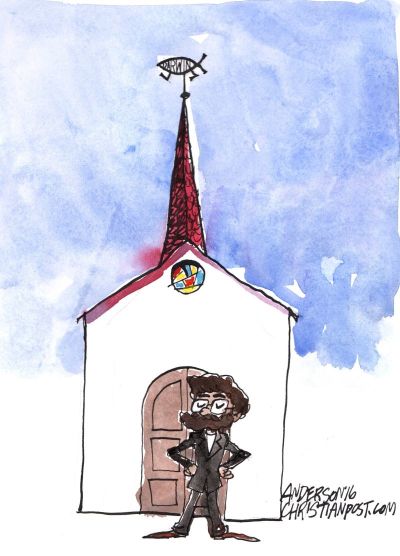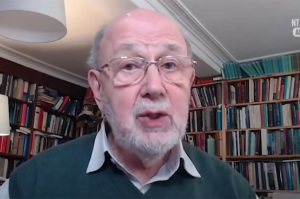Secular 'church'? How some atheists are trying to fill the void

The United States, traditionally a stronghold of religious belief, has seen a statistically verifiable and significant shift towards secularism over the past few decades.
In the summer of 2022, Gallup released the latest version of a regular poll that they conduct on American religious beliefs and behaviors, finding that “The vast majority of U.S. adults believe in God, but the 81% who do so is down six percentage points from 2017 and is the lowest in Gallup’s trend. Between 1944 and 2011, more than 90% of Americans believed in God.”
Writing for The Conversation, Phil Zuckerman summarized some of the other key findings of the study, noting that “among Americans under 30, it [the drop in the belief in God] is down to an unprecedented 68%. Up close, the trend looks even more dramatic. Only about half of Americans believe in ‘God as described in the Bible,’ while about a quarter believe in a ‘higher power or spiritual force,’ according to a Pew poll. Just one-third of Generation Z say they believe in God without a doubt.”
Parallel to the decline in religious belief is the rise of the “nones.” As of 2021, about three-in-ten U.S. adults (29%) are religious “nones,” meaning “those who describe themselves as atheists, agnostics, or ‘nothing in particular,’” according to a Pew Research Center poll. The percentage of Americans without religious affiliation is around 20-29%, with people who identify as “nothing in particular” accounting for the growing majority of this demographic.
Another interesting data point, and one that leads us to the topic I want to address here, is that church attendance and membership have also dropped: “Congregational membership, too, is at an all-time low. In 2021 Gallup found that, for the first time ever, fewer than half of Americans — 47% — were members of a church, synagogue or mosque.”
The data is clear: Fewer and fewer Americans profess to believe in God with each passing year; and when it comes to the younger generations, the lack of faith, and the decline of Christianity, is rising rapidly.
But what these numbers won’t tell you — what they can’t tell you — is that there has been absolutely no decline at all in the number of “worshippers” in the United States. Everyone worships something. Everyone believes in some “god.”
Perhaps, then, a better way to explain the data is not that Americans are becoming less religious, but that they are trading in the one true Christian faith for cheap knockoffs. After all, even atheism is a religion.
And religion, of all stripes, is an organizing principle. No matter how much the darkened hearts and minds of those who reject God try to fill the void left behind by abandoning true worship, it can’t be done. Reaching escape velocity from the gravity of the need for God in a human heart is an impossible task. Augustine explains why in Confessions: “Because you have made us for Yourself, O God, and our hearts are restless till they find their rest in Thee.”
Sadly, this doesn’t stop people from trying to find paltry substitutes. Yahoo recently published a piece by Jacqui Frost from Purdue University that documents the rise of secular or atheist “churches.”
Frost begins her article with this observation and question:
“Shared testimonies, collective singing, silent meditation and baptism rituals — these are all activities you might find at a Christian church service on a Sunday morning in the United States. But what would it look like if atheists were gathering to do these rituals instead?”
What would it look like? In short, a hollow humanistic ritual that manages to replicate the form of church with none of the spiritual substance and transcendent meaning.
Frost continues by arguing that “As a sociologist of religion who has spent the past 10 years studying nonreligious communities, I have found that atheist churches serve many of the same purposes as religious churches. Their growth is evidence that religious decline does not necessarily mean a decline in community, ritual or people’s well-being.”
Ritual? Sure. Community? Maybe. But “well-being?” The Bible teaches us that mankind is both body and soul. We don’t just need ritual, or community, or routine — we need to know and worship God. True, holistic well-being can only be found through the saving power of the Gospel of Jesus Christ. In Matthew 4:4 Jesus rebukes the devil by reminding him:
“It is written, ‘Man shall not live by bread alone, but by every word that comes from the mouth of God.’”
Frost explains that “Secular congregations often mimic religious organizations by using the language and structure of a ‘church,’ such as meeting on Sundays or hearing a member’s ‘testimony,’ or by adapting religious language or practices in other ways.”
What she and these secular congregations fail to realize is that it’s the Word that gives meaning to the Sunday morning assembly we call church, not the mere fact that people get together and go through a routine.
Yet the fact that atheists and secular assemblies borrow so heavily from the Christian tradition in their attempts to reverse engineer what God has already given us in the church shows that the quest for meaning and belonging that can only be found in God is indeed inescapable.
David Foster Wallace, the critically acclaimed American writer, eloquently put this instinct into words in a now-famous quote:
“Here’s something else that’s weird but true: in the day-to-day trenches of adult life, there is actually no such thing as atheism. There is no such thing as not worshipping. Everybody worships. The only choice we get is what to worship.”
The rise of secular “churches” serves as a poignant reminder that everyone worships. Atheism, at the end of the day, is a myth. As creatures, we were made to know and worship our Creator. Refusing to worship the true God doesn’t mean that you don’t worship — it just means that, ultimately, you worship idols. The prophet Jeremiah condemns this misguided and futile effort to replace God: “For my people have committed two evils: they have forsaken me, the fountain of living waters, and hewed out cisterns for themselves, broken cisterns that can hold no water” (Jeremiah 2:13).
Secular assemblies are nothing more than broken cisterns, hewn by human hands, that hold no water. These poor people are dying of thirst but digging wells in all the wrong places. Their humanistic gatherings betray their need for living water — which can only be found in a Christian church that worships the true Christ, who affirmed and fulfilled the Scriptures, and who was crucified for our sins, raised to life for our justification, and now rules and reigns over all things.
Jesus Himself gave us the prescription in John 7:37-38: “If anyone thirsts, let him come to me and drink. Whoever believes in me, as the Scripture has said, ‘Out of his heart will flow rivers of living water.’”
Originally published at the Standing for Freedom Center.
William Wolfe is a visiting fellow with the Center for Renewing America. He served as a senior official in the Trump administration, both as a deputy assistant secretary of defense at the Pentagon and a director of legislative affairs at the State Department. Prior to his service in the administration, Wolfe worked for Heritage Action for America, and as a congressional staffer for three different members of Congress, including the former Rep. Dave Brat. He has a B.A. in history from Covenant College, and is finishing his Masters of Divinity at The Southern Baptist Theological Seminary.
Follow William on Twitter at @William_E_Wolfe




























